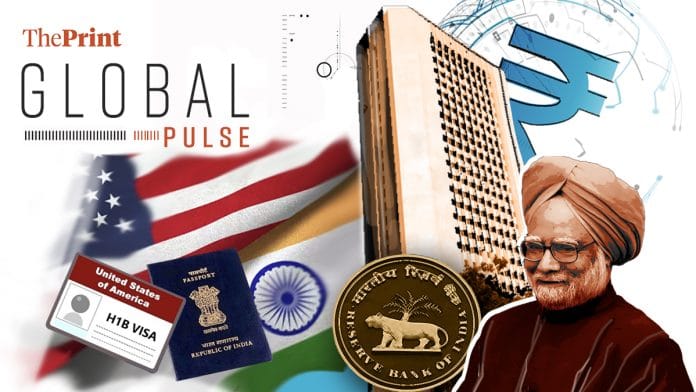New Delhi: Former Indian Prime Minister Dr. Manmohan Singh was one of the greatest men Martin Wolf, the chief economics commentator at the Financial Times, ever knew. He was a “special man at a special time”, Wolf writes in the moving tribute, ‘An economically dynamic India is Manmohan Singh’s greatest legacy.’
Wolf had known the former prime minister since 1974 when he worked in the World Bank’s India Division and Singh was the government of India’s chief economic adviser.
He describes Singh as one of the most important policymakers of the era and his legacy includes the “example he gave of intelligent, informed and honourable public service”.
He was a man who took ideas seriously and was “unfailingly courteous” to the ideas of others. He was a “global asset to India” too.
“India benefited from the fact that people with power were willing to trust him to use it well at critical moments. He, in turn, provided something that today’s populists increasingly despise: knowledge, wisdom and experience. He also knew the importance of brilliant colleagues,” writes Wolf, quoting the Mercatus Center’s description of him as “India’s finest talent scout”.
“In some quarters today, all this would condemn him as an embodiment of the ‘deep state’. That is because these people lack belief in the ideal of public service. Singh did believe in it. He believed, too, in a thriving democracy. Indeed, he thought India could not survive without one,” Wolf continues.
The rest of the article unpacks Singh’s vision for the Indian economy, and whether it is truly is on the track he set it on. The past three decades have transformed India, Wolf concedes, but he thinks it’s “rather unlikely” that India will become the developed economy it aspires to be in 2047. If India’s growth persists, Wolf is sure India will become an “economic superpower” by then—but both the rise of inequality and China’s GDP in comparison pose a threat.
It is a valid fear that a lot of economists have. Reuters reports on India’s economic forecast of annual growth of 6.4 percent—the slowest in years and far below the government’s own projections.
“The downgrade follows disappointing economic indicators and a slowdown in corporate earnings in the second half of 2024, which have forced investors to rethink the country’s earlier outperformance and cast doubts over Prime Minister Narendra Modi’s ambitious economic targets,” Shivangi Acharya and Nikunj Ohri report for Reuters.
“The fresh worries are heightening calls for authorities to lift sentiment by loosening monetary settings and slowing the pace of fiscal tightening, especially as Donald Trump’s looming second presidency throws more uncertainty over the global trade outlook,” the report, ‘India’s Modi looks to new economic playbook as risks mount.’
Apart from the customary meetings the finance ministry holds ahead of presenting the Union Budget on 1 February, Indian policymakers have been holding a “flurry of meetings” with businesses amid faltering demand, the report says.
“As confidence wanes, the political urge to stimulate growth appears to be broadening,” Reuters reports, noting some “high profile changes” the Modi government recently made to lift economic growth as a priority over price stability. One of these includes replacing former Reserve Bank of India (RBI) governor Shaktikanta Das with Sanjay Malhotra, who Reuters calls a “trusted bureaucrat”.
But trade analysts warn that India needs a credible plan to fight incoming President Donald Trump’s expected tariff wars.
“If China remains the main target of Trump’s tariffs, that could present an opportunity for India to boost its trade profile, although it would also need to let the rupee fall further to make its exports more competitive, economists said,” the report says.
Meanwhile, in the report ‘Indians slam MAGA ‘war’ over H-1B skilled-worker visas as ‘racist’’, the Washington Post reports on the “civil war” brewing among Trump’s supporters over the H-1B visas and whether Indians should continue getting them. The article notes the accusations of racism coming from commentators in India as one faction of Trump’s supporters—such as far-right activist Laura Loomer—calls for the visa programme to be amended.
Quoting several recent Indian editorials on the subject, the article describes how Indians are unhappy that Trump’s supporters don’t recognise the extent of foreign contributions to the US economy.
“For decades, the H-1B programme has allowed hundreds of thousands of computer programmers and other high-skilled workers from India to work in the United States on a temporary basis. In 2023, Indians made up more than 70 percent of all H-1B workers, according to US Citizenship and Immigration Services data,” researcher Anant Gupta reports for the Post. “Critics say the programme has failed in its original purpose of attracting the most highly skilled labour and is mainly used by tech companies to avoid hiring Americans in favour of lower-paid workers from abroad.”
Both Elon Musk and Trump have since publicly supported the programme and its track record of bringing “talent” and tech workers to America—even as Indian leaders in the past have referred to its draw as a “brain drain.”
“With Trump coming out in favour of the H-1B programme, the controversy in itself is unlikely to cause major friction in the US-Indian relationship in the short term. It does, however, reveal the growing belligerence among hardcore supporters of the respective administrations in the two countries and the shrinking space for nuance in discussions on complex issues such as immigration,” the article observes.
(Edited by Sanya Mathur)
Also Read: India’s higher education ‘paradox’ & what country’s ties with US may look like under Trump






